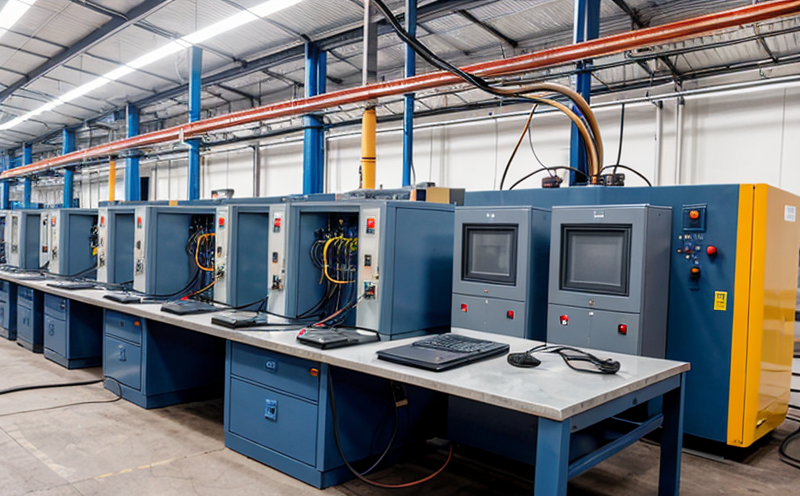IEC 61377 Electronic Power Converter Testing
The International Electrotechnical Commission (IEC) Standard 61377-1 defines the testing, qualification and certification of electronic power converters. This standard ensures that electronic power converters meet international quality benchmarks for safety, efficiency, reliability, and compliance with relevant regulations.
Electronic power converters are critical components in industrial manufacturing processes where they convert electrical energy into a form suitable for specific applications. These devices can range from simple rectifiers to complex inverters used in renewable energy systems, uninterruptible power supplies (UPS), and variable frequency drives (VFD).
The testing outlined by IEC 61377-1 is designed to ensure that the electronic power converter operates within specified parameters under a variety of conditions. This includes tests for electromagnetic compatibility (EMC), efficiency at different load levels, harmonic distortion, and stress tests to verify durability.
Our laboratory uses state-of-the-art equipment and adheres strictly to IEC 61377-1 guidelines to provide accurate, reliable testing results. Our team of experts is fully certified and experienced in conducting these tests ensuring that the data we generate can be trusted by our clients.
- EMC Testing: Ensures the device does not interfere with other devices or equipment within its environment.
- Efficiency Tests: Measure how efficiently the converter transforms electrical power into a usable form.
- HVDC & AC Tests: Verify performance under high voltage direct current (HVDC) and alternating current (AC).
- Stress Testing: Simulates real-world operating conditions to assess long-term reliability.
The testing process involves a detailed preparation of the specimens, which can include cleaning, labeling, and ensuring all components are correctly assembled. Once prepared, the specimen undergoes rigorous testing using specialized equipment that simulates operational environments. The data collected is then analyzed and reported according to IEC 61377-1 standards.
Our services encompass a comprehensive approach to ensure compliance with international standards. We provide detailed reports highlighting any non-conformities, along with recommendations for improvements if necessary. This ensures that our clients can confidently use their products in demanding industrial environments.
Industry Applications
IEC 61377-1 testing is essential in various sectors of the industrial manufacturing and processing industry, where electronic power converters are integral to operations. In renewable energy systems, for example, inverters play a crucial role in converting solar or wind-generated DC power into AC usable by electrical grids.
In uninterruptible power supplies (UPS), the efficiency and reliability of the power converter can mean the difference between minor inconvenience and catastrophic failure during outages. Similarly, variable frequency drives (VFD) used in motor control applications ensure efficient operation with reduced energy consumption.
Our testing services cater to industries such as manufacturing, renewable energy, electronics, and transportation. By adhering strictly to IEC 61377-1 guidelines, we provide the necessary assurance that these critical components are safe, reliable, and comply with international standards.
Quality and Reliability Assurance
The quality and reliability of electronic power converters directly impact industrial operations. Ensuring compliance with IEC 61377-1 is not just about meeting regulatory requirements but also about enhancing product performance, reducing failures, and extending service life.
- Compliance: Ensures that the device meets all specified standards for safety and efficiency.
- Durability: Tests confirm the converter's ability to withstand operational stress over extended periods.
- Safety: Verifies that the device operates safely within its intended environment, preventing potential hazards.
- Performance: Measures how efficiently the device performs under various conditions, optimizing energy usage and output quality.
The tests conducted adhere to international standards such as IEC 61377-1. These standards are recognized globally for their rigorous approach to ensuring product reliability and safety. By complying with these standards, our clients can ensure that their products meet the highest industry expectations.
Customer Impact and Satisfaction
By providing IEC 61377-1 testing services, we aim to enhance customer satisfaction through superior product quality. Our comprehensive approach ensures that each component tested is not only safe but also reliable and efficient.
This commitment translates into several benefits for our clients:
- Increased Safety: By adhering strictly to IEC 61377-1, we ensure that the products used in critical applications are free from potential hazards.
- Better Performance: Testing ensures optimal performance under various conditions, which can lead to cost savings through reduced energy consumption and improved output quality.
- Extended Service Life: Stress testing helps identify areas for improvement, leading to longer-lasting products that require fewer replacements and repairs.
- Regulatory Compliance: Ensuring compliance with international standards allows clients to sell their products in a wide range of markets without facing regulatory challenges.
We work closely with our customers throughout the testing process, providing detailed reports and recommendations for improvement. This collaborative approach ensures that we meet each client's unique needs and expectations, leading to higher satisfaction levels.





